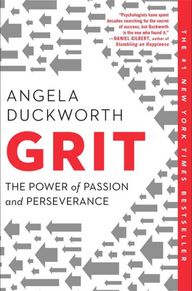41. Grit - Angela Duckworth (📖)
20 Aug 2018
Reading Notes:
What we say we care about may not correspond wuth what –deep down– we actually believe to be more valuable. It’s a little like saying we don’t care at all about physical attractiveness in a romantic partner and then, when it comes to actually choosing whom to date, picking the cute guy over the nice one.
“With everything perfect,” Nietzsche wrote, “we do not ask how it came to be.” Instead we rejoice in the present fact as though it came out of the ground by magic.”
“No one can see in the work of the artist how it has become.”
In other words, we want to believe that Mark Spitz was born to swim in a way that none of us were and none of us could. We don’t want to sit on the pool deck and watch him progress from amateur to expert. We prefer our excellence fully formed. We prefer mystery to mundanity.
“Our vanity, our self-love, promotes the cult of the genius.” Nietzsche said. “For if we think of genius as something magical, we are not obliged to compare ourselves and find outselves lacking … To call someone ‘divine’ means: ‘here there is no need to compete.”
Interest > Capacity to practive > Purpose > Hope.
From the very beginning to the very end, It is inestimably important to learn to keep going even when things are difficult, even when we have doubts. At various points, in big ways and small, we get knocked down. If we stay down, grid loses. If we get up, grit prevails.
most grit paragons I’ve interviewed told me they spent years exploring several different interests, and the one that eventually came to occupy all of their waking (and some sleeping) thoughts wasn’t recognizably their life’s destiny on first acquaintance.
What prevents a lot of young people from developing a serious career interest in unrealistic expectations.
“There are alot of things where the subtleties and exhilarations come with sticking with it for a while, getting elbow-deep into something. A lot of things seem uninteresting and superficial until you start doing them and, after a while, you realize that there are so many facets you didn’t know at the start, and you never can fully solve the problem, or fully understand it, or what have you. Well, that requires that you stick with it.
To the thirty-something on Reddit with a “fleeting interest in everything” and “no career direction” here’s what science has to say: passion for your work is a little bit of discovery, followed by a lot of development and then a lifetime of deepening.
Interests are not discovered through Introspection. Instead, interests are triggered by interactions with the outside world.
The reality is that our early interests are fragile, vaguely defined, and in need of energetic, years-long cultivation and refinement.
Olympic gold medalist rower Mads Rasmussen offered a similar account of his motivation. “It’s about hard work. When it’s not fun, you do what you need to do anyway. Because when you achieve results, it’s incredibly fun. You get to enjoy the ‘Aha’ at the end, and that is what drags you a long a lot of the way.”
It isn’t suffering that leads to hopelessness. It’s suffering you think you can’t control.
When you keep searching for ways to change your situation for the better, you stand a chance of finding them.
Or as Henry Ford is often quoted as saying, “Whether you think you can, or think you can’t – you’re right.”
“I really do think people develop theories about themselves and the world, and it determines what they do.”
growth mindset -> optimistic self-talk -> perserverance over adversity
So much for sticking with things is believing you can do it. That belief comes from self-worth. And that comes from how others have made us feel in our lives.”
There’s a hard way to get grit and an easy way. The hard way is to do it by yourself. The easy way is to use conformity – the basic human drive to fit in – because if you’re around alot of people who are gritty, you’re going to act grittier.”
Ta-Nehisi Coates (Between the world and me)
The challenge of writing Is to see your horribleness on page To see your terribleness And then go to bed.
And wake up the next day, And take that horribleness and that terribleness, And refine it, And make it not so terrible and not so horrible, And then go to bed again.
And come the next day, And refine it a little bit more, And make it not so bad, And then to go to bed the next day.
And do it again, And make it maybe average, And then one more time, If you’re lucky, Maybe you get to good.
And if you’ve done that, That’s a success.